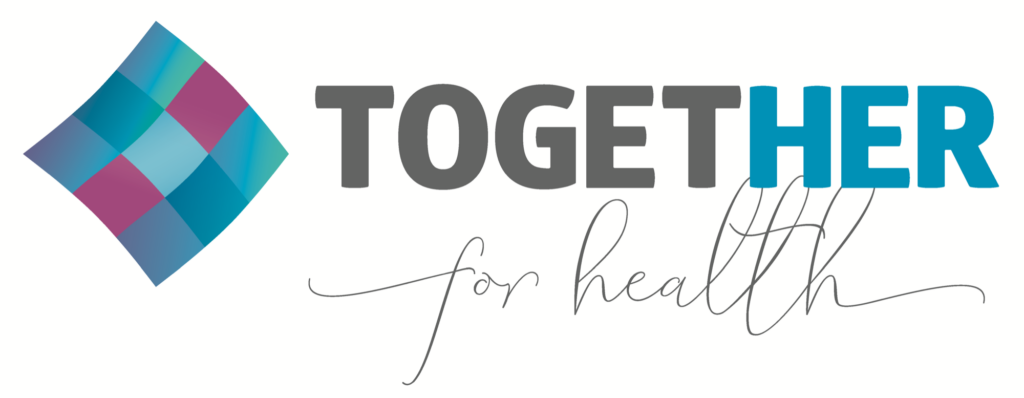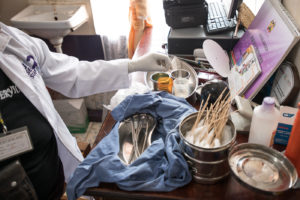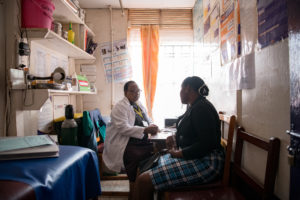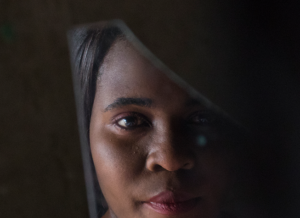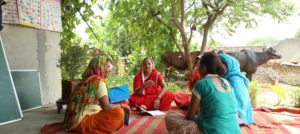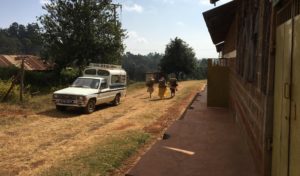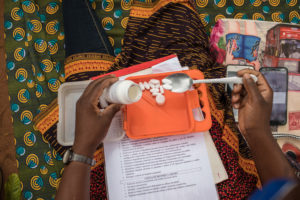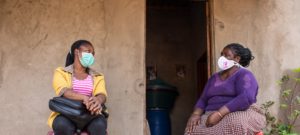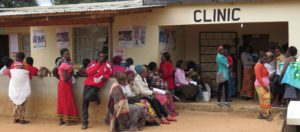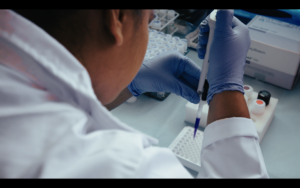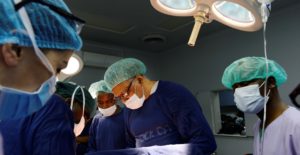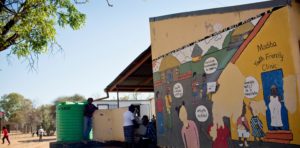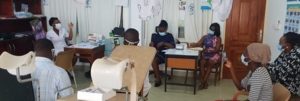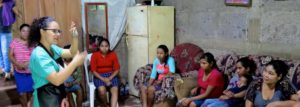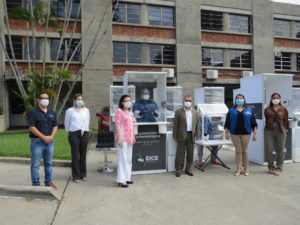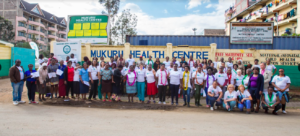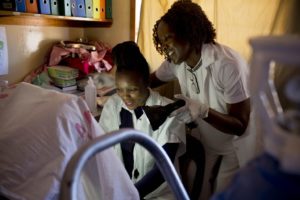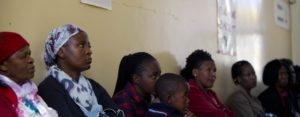News Feed
For those of us working in global cervical cancer prevention/control, 2020 began as the year the world would set a course towards ending this disease, a remarkable milestone for the global cervical cancer community, and for the world. The emergence of COVID-19 changed the trajectory of our personal and professional lives this year, cutting a swath of both unpredictability and tragedy. Despite the COVID-19 pandemic’s disruption, we were still fortunate to witness history in the making on November 17th, when the World Health Organization approved its Global Strategy to Accelerate the Elimination of Cervical Cancer as a Public Health…
More...TogetHER Executive Director Heather White was asked to provide comments at the 47th Meeting of the Joint United Nations Programme on HIV/AIDS (UNAIDS) Programme Coordinating Board on Friday, December 18th. This critical gathering focused on reviewing progress in the development of UNAIDS’ forthcoming Global AIDS Strategy for 2021-2026. The Programme Coordinating Board included a special thematic session: Cervical cancer and HIV: addressing linkages and common inequalities to save women’s lives. Dr. White’s comments are presented here in full. Thank you for the opportunity to address the delegation today, and for highlighting the fight against cervical cancer. My name is Dr.…
More...Photo credit: UNAIDS Every year World AIDS Day offers a unique opportunity to reflect on progress in the battle against HIV and AIDS, as well as comorbidities – including cervical cancer. The emergence of COVID-19 has made 2020 a most exceptional year in almost all aspects of global health, including efforts to achieve UNAIDS’ 90-90-90 HIV treatment targets. Even more striking are recent data indicating that lockdowns associated with COVID-19 – necessary to slowing its spread – are also unfortunately associated with higher risk to the health and safety of girls and women, increasing domestic abuse, sexual assault and unwanted…
More...November 19, 2020 The impact of COVID-19 on global cervical cancer prevention efforts has been wide-ranging, with unclear long-term ramifications. Our new TogetHER Interview series provides an opportunity for key leaders in global cervical cancer control to discuss current challenges and provide perspective on where the field needs to go from here. This installment of the TogetHER Interview series features Dr. Partha Basu, Head of the International Agency for Research on Cancer’s Screening Group. Headshot photo credit: IARC How have you and your organization been impacted by and adapted to COVID-19? The International Agency for Research on Cancer (IARC) is the specialized cancer…
More...November 16, 2020 The impact of COVID-19 on global cervical cancer prevention efforts has been wide-ranging, with unclear long-term ramifications. Our new TogetHER Interview series provides an opportunity for key leaders in global cervical cancer control to discuss current challenges and provide perspective on where the field needs to go from here. This installment of the TogetHER Interview series features Ellen Starr, Executive Director of Grounds for Health. Header and headshot photo credit: Grounds for Health How have you and your organization been impacted by and adapted to COVID-19? Grounds for Health works in cervical cancer prevention in coffee-growing regions around the world.…
More...November 12, 2020 The impact of COVID-19 on global cervical cancer prevention efforts has been wide-ranging, with unclear long-term ramifications. Our new TogetHER Interview series provides an opportunity for key leaders in global cervical cancer control to discuss current challenges and provide perspective on where the field needs to go from here. This installment of the TogetHER Interview series features Dr. Mengistu Asnake Kibret, Country Director for Ethiopia, Pathfinder International. Header photo credit: Ricardo Franco/Pathfinder International. Headshot photo credit: Pathfinder International. How have you and your organization been impacted by and adapted to COVID-19? As Pathfinder’s country director in Ethiopia, I will speak…
More...November 10, 2020 The impact of COVID-19 on global cervical cancer prevention efforts has been wide-ranging, with unclear long-term ramifications. Our new TogetHER Interview series provides an opportunity for key leaders in global cervical cancer control to discuss current challenges and provide perspective on where the field needs to go from here. This installment of the TogetHER Interview series features Lois Quam, President and Chief Executive Officer of Pathfinder International. Header photo credit: Ricardo Franco/Pathfinder International. Headshot photo credit: Pathfinder International. How have you and your organization been impacted by and adapted to COVID-19? When the pandemic became our reality in March, and…
More...Photo Credit: WHO Cervical cancer kills more than 300,000 women every year – equating to a death every two minutes. Yet, these deaths are not inevitable. We know how to combat this disease. Through effective population-based prevention measures, including widespread deployment of HPV vaccine and robust screening programs to detect and treat early disease, we will save lives. Urgent action – in the form of political will and resource mobilization – is needed to scale up the implementation of these proven cost-effective measures. In 2018, Dr. Tedros Adhanom Ghebreyesus, Director-General of the World Health Organization (WHO), called for a series…
More...October 29, 2020 The impact of COVID-19 on global cervical cancer prevention efforts has been wide-ranging, with unclear long-term ramifications. Our new TogetHER Interview series provides an opportunity for key leaders in global cervical cancer control to discuss current challenges and provide perspective on where the field needs to go from here. This installment of the TogetHER Interview series features Carrie Hessler-Radelet, President and CEO of PCI, a Global Communities Partner, and President of Global Communities. Header photo credit: Ashley Dittmar for PCI. Headshot photo credit: PCI How have you and your organization been impacted by and adapted to COVID-19? Unplanned program shifts…
More...October 27, 2020 The impact of COVID-19 on global cervical cancer prevention efforts has been wide-ranging, with unclear long-term ramifications. Our new TogetHER Interview series provides an opportunity for key leaders in global cervical cancer control to discuss current challenges and provide perspective on where the field needs to go from here. This installment of the TogetHER Interview series features Karl Hofmann, President and CEO of Population Services International (PSI). Header and headshot photo credit: PSI How have you and your organization been impacted by and adapted to COVID-19? Like everyone and every organization everywhere, COVID-19 has disrupted PSI’s work and the way…
More...October 21, 2020 The impact of COVID-19 on global cervical cancer prevention efforts has been wide-ranging, with unclear long-term ramifications. Our new TogetHER Interview series provides an opportunity for key leaders in global cervical cancer control to discuss current challenges and provide perspective on where the field needs to go from here. This installment of the TogetHER Interview series features Prof. Groesbeck Parham, Honorary Consultant at the University of Zambia and professor of gynecologic oncology in the department of obstetrics and gynecology at the University of North Carolina at Chapel Hill . Header photo credit: Friends of Africa, Inc. Headshot credit: University of…
More...Congratulations to TogetHER member Jhpiego, who recently marked the closure of their successful partnership to screen women for cervical cancer and treat pre-cancerous lesions from 2015 through 2020, funded by the United States President’s Emergency Plan for AIDS Relief (PEPFAR) through the Center for Disease Control and Prevention (CDC). Botswana Ministry of Health & Wellness Deputy Permanent Secretary for Health Services Dr. Mareko Ramotsababa joined Jhpiego’s Acting Country Director Dr. Amon Marwiro and other senior staff of the Ministry of Health & Wellness (MOH) at a ceremony to celebrate the program’s exciting results. The MOH and Jhpiego trained 171 health…
More...October 15, 2020 The impact of COVID-19 on global cervical cancer prevention efforts has been wide-ranging, with unclear long-term ramifications. Our new TogetHER Interview series provides an opportunity for key leaders in global cervical cancer control to discuss current challenges and provide perspective on where the field needs to go from here. This installment of the TogetHER Interview series features Dr. Kofi Effah, who heads the Cervical Cancer Prevention and Training Centre (CCPTC) in Catholic Hospital in Battor, Ghana. Header and headshot photo credit: CCPCTC How have you and your organization been impacted by and adapted to COVID-19? In 2020, we started strongly…
More...October 13, 2020 The impact of COVID-19 on global cervical cancer prevention efforts has been wide-ranging, with unclear long-term ramifications. Our new TogetHER Interview series provides an opportunity for key leaders in global cervical cancer control to discuss current challenges and provide perspective on where the field needs to go from here. This installment of the TogetHER Interview series features The Lily Project’s Co-Founder and Executive Director, Anielka Medina. Header and headshot photo credit: The Lily Project How have you and your organization been impacted by and adapted to COVID-19? The short answer is it has impacted everyone and everything. Our teammates have…
More...October 8, 2020 The impact of COVID-19 on global cervical cancer prevention efforts has been wide-ranging, with unclear long-term ramifications. Our new TogetHER Interview series provides an opportunity for key leaders in global cervical cancer control to discuss current challenges and provide perspective on where the field needs to go from here. This installment of the TogetHER Interview series features Basic Health International’s Executive Director, Mauricio Maza. Header and headshot photo credit: Basic Health International How have you and your organization been impacted by and adapted to COVID-19? As in many areas of the world, BHI has been impacted by COVID. Our research…
More...October 5, 2020 The impact of COVID-19 on global cervical cancer prevention efforts has been wide-ranging, with unclear long-term ramifications. Our new TogetHER Interview series provides an opportunity for key leaders in global cervical cancer control to discuss current challenges and provide perspective on where the field needs to go from here. This installment of the TogetHER Interview series features PATH President & CEO Nikolaj Gilbert. Header photo: PATH How have you and your organization been impacted by and adapted to COVID-19? PATH has not been immune to the challenges that COVID-19 has dealt all of us. As a public health organization, we…
More...-September 30, 2020 The impact of COVID-19 on global cervical cancer prevention efforts has been wide-ranging, with unclear long-term ramifications. Our new TogetHER Interview series provides an opportunity for key leaders in global cervical cancer control to discuss current challenges and provide perspective on where the field needs to go from here. This installment in our TogetHER Interview series features Elizabeth Mbuthia, Co-Founder and Member of Women 4 Cancer. Photo credit: Women 4 Cancer How have you and your organization been impacted by and adapted to COVID-19? Women 4 Cancer is a Kenya-based non-profit organization formed in 2012 to address…
More...-September 22, 2020 The impact of COVID-19 on global cervical cancer prevention efforts has been wide-ranging, with unclear long-term ramifications. Our new TogetHER Interview series provides an opportunity for key leaders in global cervical cancer control to discuss current challenges and provide perspective on where the field needs to go from here. The first installment in our TogetHER Interview series features Jhpiego President & CEO Leslie Mancuso, who spoke to us during the 2020 UN General Assembly. How have you and your organization been impacted by and adapted to COVID-19? Nine months into the pandemic, COVID-19 touches Jhpiego’s work in…
More...Cervical cancer is the most common cancer among women in Botswana, and is the most common cause of cancer death in the small nation of 2.3 million people, regardless of gender. Women in Botswana face multiple barriers to cervical cancer prevention despite important efforts to provide universal access to cervical cancer screening and to scale up vaccination against HPV. TogetHER member Jhpiego has been working closely with Botswana’s influential network of nurses to test new and more acceptable forms of cervical cancer screening and treatment. TogetHER’s newest case study describes how garnering the perspectives of women has guided the assessment…
More...The MoviCancer Foundation is working to expand the capacity of health workers in Nicaragua to prevent and treat cervical cancer using a WHO-approved method for pre-cancer treatment known as thermal ablation. Portable, battery-powered thermal ablation devices now offer health workers the chance to treat women immediately following their clinical exam, without the need for electricity or gas. MoviCancer’s thermal ablation efforts are supported, in part, through TogetHER’s Cervical Cancer Grants Program, which provides small, highly targeted grants to programs generating the evidence needed to speed access and uptake of cervical cancer prevention technologies in low- and middle-income countries.
More...